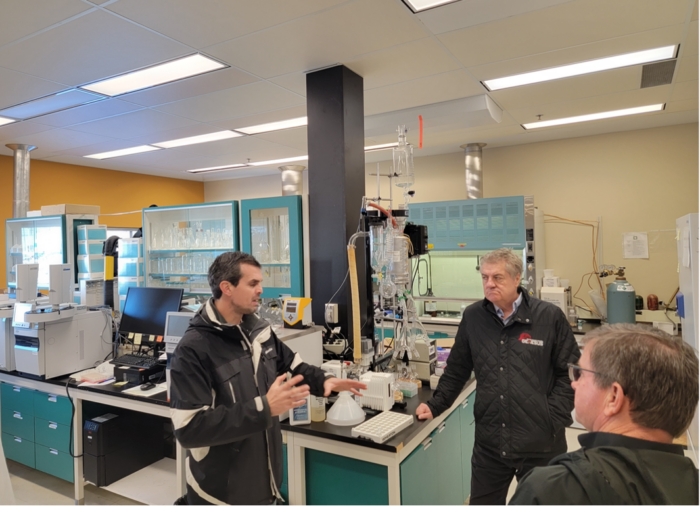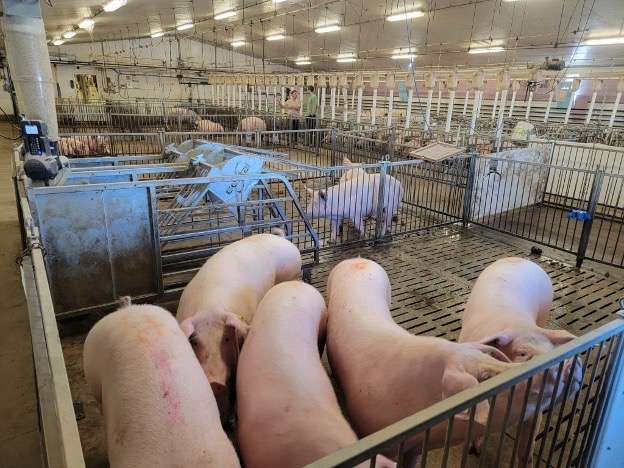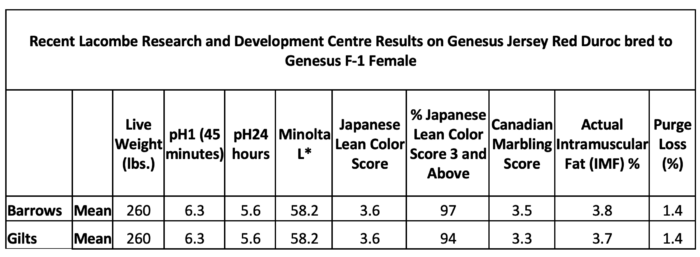Six years ago, Genesus began working with with Agriculture Canada’s Lacombe Research and Development Centre in Lacombe, Alberta and two and a half years ago Genesus had the opportunity to further collaborate on Genesus primals. This was an opportunity to further understand and work on research projects with the Lacombe Centre on Genesus primals. Lacombe Centre uses Genesus Jersey Red Duroc sire on Genesus F-1 female to produce commercial pigs and primals. The project looks at evaluating quality in various primal cuts, and then determine the genetic factors that would allow reproduction of those traits to meet specific targets. Carcass quality is the most inheritable genetic trait, it’s good to start with genetics that have good meat quality. Genesus has worked for 25 years at producing the Ultimate Tasting Pork. This collaboration with Lacombe Centre looks to further gain knowledge on the Genesus primals and continue developing the Ultimate Tasting Pork.

In a recent Prairie Hog Country article, Dr. Bob Kemp, Vice-President for Research, Development and Genetic Programs at Genesus discussed the work being done at Lacombe. “We’re trying to understand what’s controlling quality, how to properly measure quality and composition in the different primals. In previous work, Lacombe has developed a number of different technologies that work from a grading perspective per se. But we don’t know if they’ll work from a quality perspective, so the idea is to evaluate the measurements from these different primals to see if they can be used for selection, and then to investigate utilizing genomic information as well to investigate the genetic control of the different measures in the different primals and the correlation between them”, said Kemp.

Also quoted in the article is Manuel Juárez, Phenomics Scientist at Lacombe Centre. “Around the world, packers and geneticists and pork producers, they are always looking at ways of differentiating and looking at getting an advantage in what is a very competitive market.” Juárez also said, “The quality evaluation and genetics technology now being developed at Lacombe will offer packers and producers an opportunity to achieve premium prices for hogs grown to fit the markets into which they are to be sold. For packers, this is key because a good belly can generate 30 per cent more revenue than a commodity belly. So a premium cut can make quite a bit of money in comparison to a commodity primal.” The ability to guarantee that quality is essential, he said. “So, starting with genetics, it’s massive, because your pool is already better because your genetics are better. You can take this whole batch and send it to Spain or Japan or wherever. But how can you guarantee the quality? You can do selection afterwards and maybe move the bar once, but if your genetics are good . . . then the chances of having that high-quality product are good.”
Below is recent data taken from the Lacombe Centre on the Genesus primals from the Genesus Jersey Red Duroc sire on Genesus F-1 female:

Click on the below link to read the full article in Prairie Hog Country about the work being done at Lacombe Centre:
Categorised in: Featured News, Genesus Competitive Edge
This post was written by Genesus



